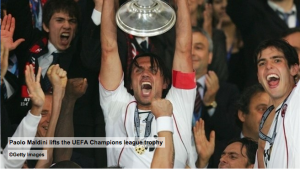Inspired by the pair of UEFA Champions league matches that I watched yesterday afternoon (for anyone following, Barcelona beat Man City 2-1, and Juventus beat Dortmund 2-1), I decided to do a little more research into what is my opinion, one of the best annual sporting tournaments in the world.
The UEFA Champions League is an annual tournament in which top-flight clubs from various European leagues square off to be crowned Champion of European Football. Although a nearly identical European-wide club competition, the European Cup, had been in existence as early as 1955, it was only in 1992 when UEFA, the Union of European Football Association, began to formally oversee operation.

Bayern Munich after winning their second consecutive European Cup title in 1976. Courtesy of http://bundesligafanatic.com/a-history-of-bayern-munchen-in-the-european-cup-final/
The European Cup comes from incredibly humble beginnings, initially established as “wednesday night challenge tournament” by Gabriel Hanot, then-editor of famous French sports daily, L’equipe. In an effort to make it a European-wide tournament, L’Equipe invited clubs from various European leagues, inviting clubs that they “considered had the most fan appeal.” Real Madrid emerged victorious in the first ever European Cup, and would go on to even win 4 more consecutive titles. With participation from clubs such as Real Madrid, Milan, and Eindhoven, the tournament immediately garnered immense interest, and continued to build off of that interest in the following years.
By 1992, UEFA overtook operations, renaming the tournament the UEFA Champions League. With it, UEFA brought major changes to the tournament. Prior to the 1992 season, invitation had only been extended to those clubs that had won their respective European league. What had only once been a knockout tournament expanded into a group stage. Coupled with the group stage addition, UEFA also expanded invitation to include those that had finished as runner’s up in their respective leagues. Though qualifiers and group stages have expanded to include more clubs and games since the 1992 changes, tournament structure today remains quite similar. Invitation is also a little more complicated then it had been in 1992, now decided by a UEFA coefficient ranking, calculated over a 5-year basis (to see the 2014/2015 coefficient rankings: http://www.uefa.com/uefachampionsleague/season=2015/accesslist/listofparticipants/index.html)
Real Madrid is the most successful club in the UEFA Champions League tournament with 10 titles to their name. They are followed by AC Milan seven titles, Liverpool and Barcelona with five, and Barcelona and Ajax with four.

Paolo Maldini and AC Milan celebrate their seventh UEFA Champions League title in 2007. Courtesy of http://www.uefa.com/uefachampionsleague/season=2006/overview/index.html#200607+milan+avenge+liverpool+defeat
In my opinion, few tournaments capture that competition and excitement that the UEFA Champions League provide. As it matches the best teams in each domestic league, it provides bragging rights for both club and country. It seems as if story lines encapsulate each season in dramatic fashion – whether these story lines be the AC Milan-Liverpool saga in 2005 and 2007 or the all Madrid final in 2014.
I think a big reason behind UEFA’s success is the sheer star power that it encompasses. The Champions League provides a perfect stage for some of the world’s greatest soccer players to showcase their skills to the world at large. Players such as Messi, Cristiano Ronaldo, Di Stefano, and Henry have all displayed to the world why they are each regarded as some of the all-time greats through their Champions League performances. Although there does exists a CONCACAF Champions League, it certainly does not provide the parity and star power that is eminent with its European counterpart. With all of the allure and magic behind it, the UEFA Champions League is able to appeal to even the most casual of soccer fans.
If you have not watched, I highly suggest that you tune into either of today’s matches. Athletico Madrid and Bayer Leverkusen, and Arsenal and AS Monaco respectively square off today at 2:45pm et. Though I am not the most diehard of soccer fans, I always seem to gravitate towards UEFA Champions League matches. The constant parity of the tournament will always result in some form of drama, and will always keep you on the edge of your seat.
information courtesy of:
http://www.uefa.com/uefachampionsleague/history/background/index.html
http://en.wikipedia.org/wiki/UEFA_Champions_League
